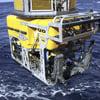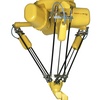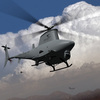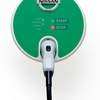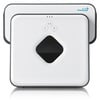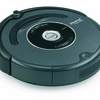Accuray Boeing Colin Angle Consumer Robotics CyberKnife CytoCare DARPA Education Financial Results Health Robotics Healthcare Robotics i.v.Station Industrial Robotics Industrial robotics International Space Station iRobot Liquid Robotics Lockheed Martin Medical Device Medical Robotics Medical robotics medical robotics Military Robotics Military robotics NASA Northrop Grumman Oceanography PackBot Remotely Operated Vehicle Research Robot Robotics ROV Schilling Robotics UAV Unmanned Aerial Vehicle unmanned aerial vehicle Unmanned aerial vehicle Unmanned Underwater Vehicle UUV
Industry, Academia Team Up for National Robotics Week
February 9, 2010
April 10-18, 2010 will welcome the first annual National Robotics Week. According to a press release announcing the weeklong celebration, the effort is aimed at "recognizing robotics technology as a pillar of 21st century American innovation, highlighting its growing importance in a wide variety of application areas, and emphasizing its ability to inspire technology education."
During National Robotics Week, a number of scheduled events and activities will try to increase public awareness of the growing importance of "robo-technology" and the tremendous social and cultural impact that it will have on the future of the United States.
National Robotics Week represents the culmination of an effort by leading universities and companies to create a "national roadmap" for robotics technology, which was initially unveiled at a May 2009 briefing by academic and industry leaders to the Congressional Caucus on Robotics.
The National Robotics Week Advisory Council was organized by iRobot Corp. and The Technology Collaborative, a Pittsburgh-based non-profit economic development organization. A large and diverse group of companies, universities and nonprofit organizations, including: Adept Technology, the Association for Unmanned Vehicle Systems International (AUVSI); AUVSI Foundation; Carnegie Mellon University; FIRST (For Inspiration and Recognition of Science and Technology); Infamous Robotics; and MIT, among others, are actively involved in this endeavor as well.
To learn more about National Robotics Week events and activities, visit: www.nationalroboticsweek.org.
Harvest Automation, Inc., Raises Capital
January 14, 2010Groton, MA-based Harvest Automation, Inc., a robotics company developing solutions for material handling, announced this week that it has secured $4.0M in Series A financing.
Charlie Grinnell, founder and CEO of HarvestAI is excited by the prospect of bringing a different approach to the material handling robotics space."Our expertise is in applying practical robotics to improve worker productivity with a focus on harsh, manual labor tasks," he said. "Traditional material handling robots have been associated with fixed-function factory automation, which generally operate in indoor, tightly controlled work spaces. We have a very different solution that uses teams of small, agile, mobile robots (AMR's) designed to work flexibly with human workers in a broad range of uncontrolled environments making them suitable for many market applications."
Life Sciences Partners (LSP), the Midpoint Food & Ag Fund, and Massachusetts Technology Development Corporation provided the funding.
The HarvestAI engineering and executive team has links to other robotics and technology firms such as iRobot Corporation, DEKA R&D, Draper Labs, Vitesse Semiconductor and Bear River Associates.
MQ-8B Fire Scout Interoperates with Army Remote Video Terminal
January 14, 2010
Northrop Grumman, developer of the land-based MQ-8B Fire Scout Vertical Unmanned Aircraft System (UAS) announced interoperability with the Army's One System Remote Video Terminal (OSRVT) at Yuma Proving Ground, Arizona.
Designed and produced by AAI Corporation, the OSRVT provides direct receipt of full-motion video and targeting metadata by capturing the Omni broadcast from UAS that are within a unit's area of operations. The Fire Scout will play a big role in the upcoming Army Expeditionary Warrior Experiment (AEWE) at Fort Benning, Ga. During AEWE, Fire Scout will perform many important Army UAS missions in support of the Infantry Brigade Combat Team.
The OSRVT video and data system enables warfighters to remotely downlink live surveillance images and critical geospatial data.
Designed and produced by AAI Corporation, the OSRVT provides direct receipt of full-motion video and targeting metadata by capturing the Omni broadcast from UAS that are within a unit's area of operations. The Fire Scout will play a big role in the upcoming Army Expeditionary Warrior Experiment (AEWE) at Fort Benning, Ga. During AEWE, Fire Scout will perform many important Army UAS missions in support of the Infantry Brigade Combat Team.
The OSRVT video and data system enables warfighters to remotely downlink live surveillance images and critical geospatial data.
Army Awards $577 Million Command System Contract
January 14, 2010The U.S. Army has awarded a contract to Northrop Grumman to develop the Integrated Air and Missile Defense Battle Command System (IBCS) under a $577 million, five-year, cost-plus-incentive-fee/cost-plus-fixed-fee contract for system design and development.
According to the Northrop Grumman Web site, IBCS is based on a non-proprietary, open architecture approach that establishes a network-centric system-of-systems solution for integrating sensors, weapons, and battle management command, control, communications and intelligence systems.IBCS will integrate current and future air and missile defense systems in an open-architecture environment. Systems that will be integrated via IBCS include Patriot, Surface-Launched Advanced Medium Range Air-to-Air Missile (SLAMRAAM), Joint Land Attack Cruise Missile Defense Elevated Netted Sensor (JLENS), Improved Sentinel radar, among others.
Northrop Grumman is leading a team that includes The Boeing Company; Lockheed Martin Corporation; Harris Corporation; Schafer Corporation; nLogic Inc.; Numerica; Applied Data Trends; Colsa Corp.; Space and Missile Defense Technologies (SMDT); Cohesion Force Inc.; Millennium Engineering and Integration Company; RhinoCorp Ltd.; and Tobyhanna Army Depot.
In a separate announcement, Boeing announced it would provide systems design, development and testing services for the IBCS.
IBCS is expected to be fielded by 2014.
National Instruments Introduces LabVIEW Robotics 2009
January 11, 2010
National Instruments recently announced LabVIEW Robotics 2009, a new version of its graphical system design software that provides a standard development platform for designing robotic and autonomous control systems.
The new offering provides developers with an extensive robotics library with connectivity to standard robotic sensors and actuators, foundational algorithms for intelligent operations and perception and motion functions for robots and autonomous vehicles.
LabVIEW Robotics 2009 can import code from other languages including C/C++, .m files and VHDL, and communicate with a wide variety of sensors using built-in drivers for everything from LIDAR, IR, sonar and GPS devices.
According to the company, LabVIEW Robotics 2009 is ideal for designing and prototyping applications including the following:
- Autonomous and semiautonomous ground vehicle
- Robot rescue platforms
- Personal and service robots
- Medical robotic devices
- Academic and research robots
- Agricultural and mining systems
Nissan Selects AeroVironment for LEAF Home-Charging Stations
January 11, 2010Nissan North America announced it has selected AeroVironment to supply electric vehicle home-charging stations and installation services supporting the introduction of the company's zero-emission, all-electric Nissan LEAF later this year.
AeroVironment designs, develops, produces, and supports an advanced portfolio of Unmanned Aircraft Systems (UAS) and efficient electric energy systems.
The LEAF is a five-passenger lithium-ion battery powered electric car that will offer drivers a range of 100 miles on a full charge. According to an official company statement, the Nissan-branded charging stations will be available at the sale of each Nissan LEAF as part of the vehicle's total driving system.
The home-charging stations must be connected to a 220-volt line, and it will reportedly take eight hours to fully charge the Nissan LEAF from a fully discharged state.
AeroVironment electricians will offer pre-installation home assessment services prior to vehicle delivery, and will install the charging stations.
Evolution Robotics Introduces Mint, Wins Award
January 11, 2010Evolution Robotics, Inc., had quite a week at CES, the Consumer Electronics Show, introducing Mint, a new automatic hard surface floor cleaning appliance, and announcing that the product was honored with a Popular Mechanics' Editor's Choice award for best new product at the Las Vegas event.
Mint is an automated appliance designed to dust and wet mop hard surface floors using popular cleaning cloths, such as Swiffer brand Dry and Wet Cloths and other similar products.
Evolution Robotics partnered with industrial designer Yves Behar and his team at fuseproject to create a device that merges a sleek design in addition to the technical capabilities of the Mint.
According to Behar, "The defined geometric shapes of Mint, clear color breaks, low-profile and very few visible buttons hint at great technology under the hood while giving a sense of simplicity and ease of use.
iRobot Sets Consumer Robotics Milestone
January 5, 2010Bedford, Mass.-based iRobot Corp. announced that it has achieved an industry milestone in the home robot market, saying it has sold over five million home robots since launching the iRobot Roomba vacuum cleaning robot in 2002.
iRobot chairman and CEO Colin Angle was quoted as saying, "This achievement represents a huge milestone for iRobot and for the robotics industry as a whole. With over five million home robots sold, we have seen a widespread acceptance of this technology. This further fuels our drive to innovate and provide solutions that make a difference in people's lives."


